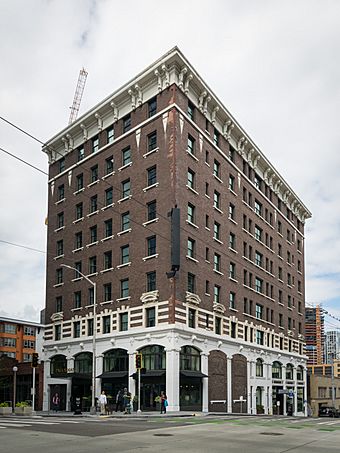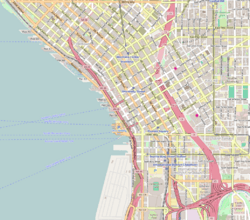Calhoun Hotel facts for kids
Quick facts for kids |
|
|
Calhoun Hotel
|
|

Calhoun Hotel in 2018
|
|
| Location | 2000 2nd Ave. Seattle, Washington |
|---|---|
| Built | 1909 |
| Architect | William P. White |
| Architectural style | Beaux Arts |
| NRHP reference No. | 13000208 |
| Added to NRHP | 2013-04-23 |
The Calhoun Hotel is a historic building in downtown Seattle, Washington. It was built in 1909. Today, it's known as the Kimpton Palladian Hotel. This building was one of the first to be finished in the area after a big project called the Denny Regrade. It is listed on the National Register of Historic Places. This means it's an important historical site.
Contents
The Story of the Calhoun Hotel
Who Was Scott Calhoun?
The Calhoun Hotel was named after Scott Calhoun (1874-1952). He was a well-known lawyer in Seattle. Scott Calhoun helped create the Port of Seattle. This port is a very important part of Seattle's trade. He was born in Port Townsend, Washington in 1874. His family moved to Seattle when he was young.
Scott Calhoun studied law at Stanford University in California. He was part of the first group to graduate in 1892. He later moved back to Seattle for good. He started buying properties in the city. He also became a city lawyer.
Building a New Hotel
In 1904, Scott Calhoun became the City Tax Attorney. By 1905, he was named the city's main lawyer, called the Corporation Counsel. In this job, he helped with many city projects. These projects changed how land was used in Seattle.
In 1909, Calhoun hired a famous local architect named W.P. White. He wanted White to design an eight-story hotel. The hotel would be built on land that was recently leveled. This area was part of the Denny Regrade project. It was becoming a new important part of Seattle.
Hotel Design and Construction
The hotel was designed in the Beaux Arts style. This style often uses grand, classical designs. The building was made of dark red brick. It had white terra cotta decorations. A metal roof edge, called a cornice, topped the building.
Construction started in May 1909. Sherman G. Combs was the contractor. The building's steel frame weighed 375 tons. The outside bricks came from the Denny-Renton Clay and Coal Company. The Calhoun Hotel was the first new building finished in the Denny Regrade area.
Life as the Calhoun Hotel
The hotel opened in October 1910. Lillie B. Wisner was its first manager. The new hotel had 153 rooms. Guests could stay for short or long visits. The rooms had hardwood floors and tiled bathrooms.
Soon after opening, Calhoun sold the hotel. New managers took over in 1912. The hotel became a popular place for events. People held tea parties, dances, and book clubs there. It stayed popular through the 1910s and 1920s.
A Radio Station in the Hotel
In 1928, a part of the hotel's lobby was changed. It became studios for radio Station KVL. The first broadcast from KVL happened on June 22. The governor, Roland H. Hartley, gave a speech.
From Hotel to Apartments and Back
By the 1980s, the Calhoun Hotel was no longer a hotel. It was used only as apartments. In 1984, a company bought it. They changed its name to the Palladian Apartments. This name was inspired by the Palladian windows on the building.
In 2014, the current owners restored the building. They turned it back into a hotel. It kept the Palladian name. The 97-room Palladian Hotel is now run by the Kimpton Hotels & Restaurants brand.
Images for kids
 | Aurelia Browder |
 | Nannie Helen Burroughs |
 | Michelle Alexander |



